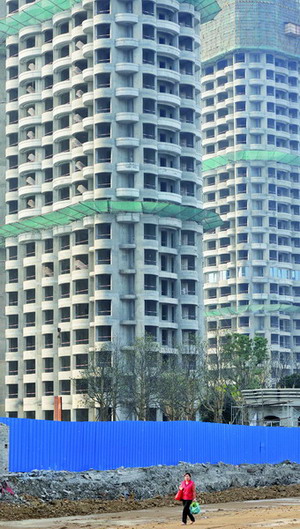 |
|
|
|
|||||||||||
Industry's poor performance due to declining prices, sales in major cities
The first-quarter score cards of listed property companies painted a gloomy picture for the sector that is expected to extend into the months ahead, if not longer.
|
 Residential property under construction in Nanjing, Jiangsu province. A survey released by the central bank on March 20 showed that 48.7 percent of 20,000 residents polled in 50 cities across the nation said they expect property prices to remain unchanged in the second half of 2012. [Photo/China Daily] |
The industry's poor performance was due to the decline in prices and sales in major cities, particularly Beijing and Shanghai. In Shanghai, for instance, some developers have offered discounts of up to 40 percent to kick-start sales.
Residential property prices in suburban Shanghai have been sliding since October 2011, but sharp declines are now being witnessed in the most expensive downtown areas, and the substantial price reductions in Shanghai are irreversible, according to Xue Jianxiong, an analyst from China Real Estate Information Corp.
The average price of high-end properties in Shanghai has fallen sharply over the past six months, according to Xie Songcai, an agent based in Pudong district, who has handled deals at some of the city's most expensive housing projects.
The average price at Shimao Riviera Garden, a high-end riverside development in Pudong district, dropped from 80,000 yuan ($12,682) per square meter in April 2010 to 46,000 yuan this month, according to online property trading platform Anjuke.com.
A survey released by the People's Bank of China on March 20 showed that 48.7 percent of 20,000 residents polled in 50 cities across the nation said they expect real estate prices to remain unchanged in the second half of 2012, while 19.7 percent said they expected price reductions, and 17.7 percent predicted property prices would rise.
About 14.1 percent of respondents said they intend to purchase property in the next three months, the lowest figure since 1999. In Beijing and Shanghai, only 9.4 percent said they would invest in real estate.
Some potential homebuyers said they would wait and see if prices fall over the next three months.
"I read newspapers and watch TV every day to follow housing price fluctuations. If the average price falls by 10 percent, I'll consider buying an apartment for my son as he is getting married soon," said Hu Jing from Hongkou district in Shanghai.
But some analysts said, despite the currently slack market, the outlook is quite promising for big property developers in the second quarter.
Zhang Bo, a stock market analyst with UBS AG, said big-cap residential developers in the A-share market are set to have better results in the second quarter.
Bigger developers will benefit from the current property market clampdown because they have more cash in hand, and will be able to acquire cash-strapped smaller ones at favorable prices.
Zhang said policy constraints on the property market had loosened earlier than expected.
"We expected it to happen in the second half, but it came early," said Zhang.
This month, large banks in Shanghai and Beijing, the country's two biggest property markets, have offered discounts of as much as 15 percent on mortgages to first-time homebuyers.
Gao Changxin contributed to this story.
wuyiyao@chinadaily.com.cn